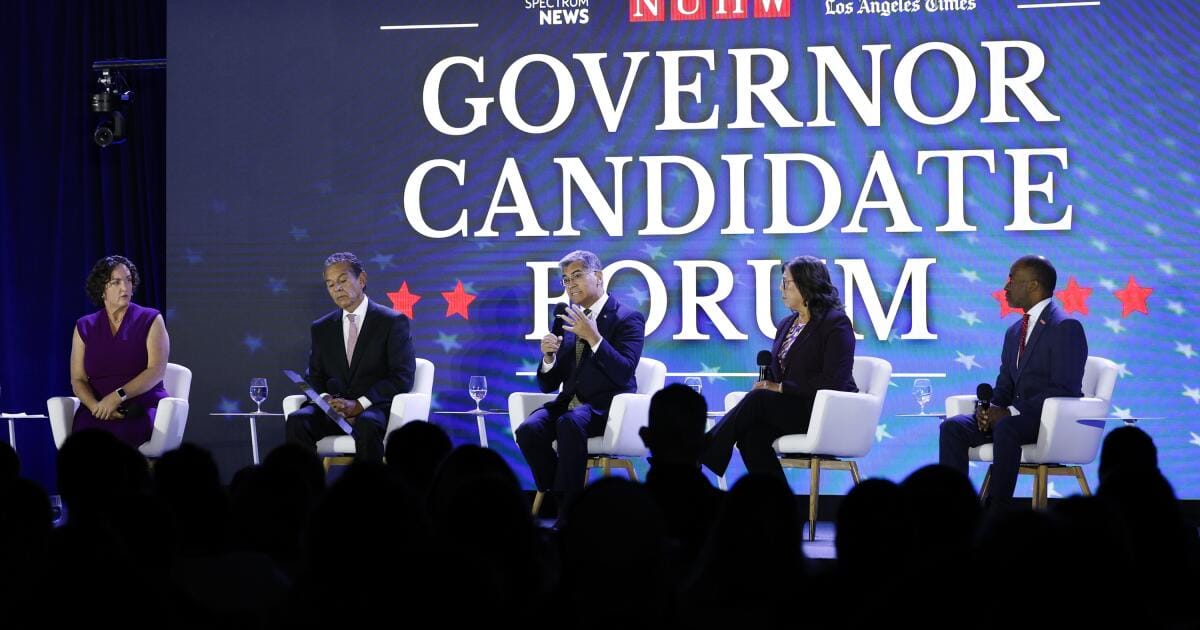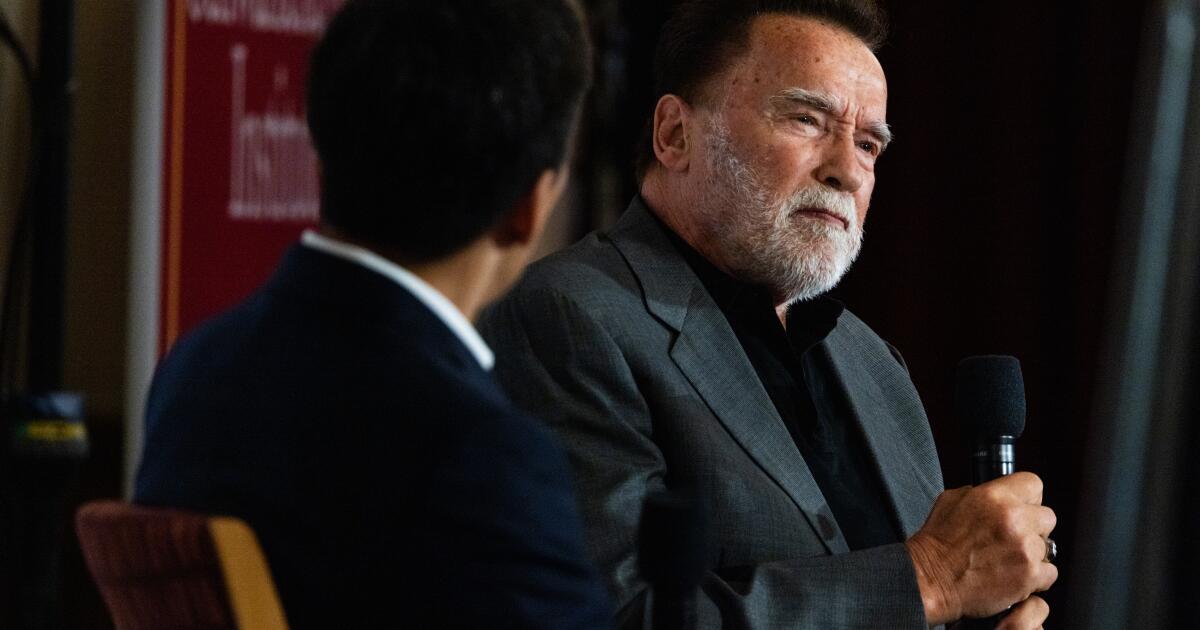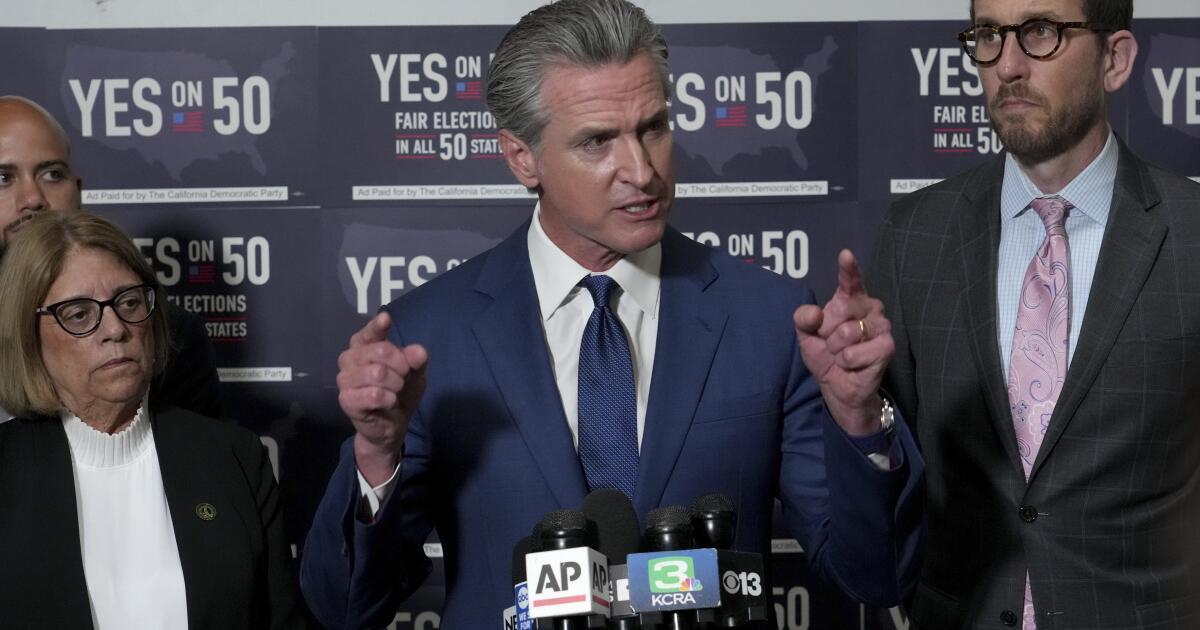Four takeaways from California’s first gubernatorial debate since Kamala Harris said she wasn’t running
In a darkened airport hotel ballroom room, a bevy of California Democrats sought to distinguish themselves from the crowded field running for governor in 2026.
It was not an easy task, given that the lineup of current and former elected officials sharing the stage at the Sunday morning forum agreed on almost all the issues, with any differences largely playing out in the margins.
They pledged to take on President Trump, make the state more affordable, safeguard immigrants and provide them with Medi-Cal healthcare benefits, and keep the state’s over-budget bullet train project intact.
There is not yet any clear front-runner in the race to run the nation’s most populous state, though former Orange County Rep. Katie Porter has had a small edge in recent polling.
Aside from a opaque dig from former state Controller Betty Yee, Porter was not attacked during the debate.
They were joined onstage by former U.S. Secretary of Health and Human Services Xavier Becerra, California Supt. of Public Instruction Tony Thurmond and former Los Angeles Mayor Antonio Villaraigosa. State Sen. Toni Atkins, who was supposed to participate, dropped out due to illness. Wealthy first-time political candidate Stephen J. Cloobeck withdrew due to a scheduling conflict.
The forum was sponsored by the National Union of Healthcare Workers, in partnership with the Los Angeles Times and Spectrum News. It was held in Los Angeles and moderated by Associated Press national planning editor Lisa Matthews, with L.A. Times California politics editor Phil Willon, Spectrum News 1 news anchor Amrit Singh and Politico senior political reporter Melanie Mason asking the questions.
Sen. Alex Padilla and businessman Rick Caruso have also both publicly flirted with a bid for the state’s top office, but have yet to make a decision.
Two major GOP candidates, Riverside County Sheriff Chad Bianco and conservative commentator Steve Hilton, are also running for California governor, but neither were invited to the debate because they did not complete an endorsement questionnaire from the union.
With Prop. 50 in the forefront, a lack of attention on the race
California’s June 2 gubernatorial primary is just eight months away, but the horde hoping to replace Gov. Gavin Newsom has been competing for attention against an extraordinarily crowded landscape, with an unexpected special election this November pulling both dollars and attention away from the race for governor. To say nothing of the fact that the race had been somewhat frozen in place for months until the end of July, when former Vice President Kamala Harris finally announced she would not be running.
The candidates reiterated their support for Proposition 50, the Newsom-led November ballot measure to help Democrats win control of the U.S. House of Representatives next year by redrawing California congressional districts. Newsom pushed for the measure to counter efforts by Republican-led states to reconfigure their congressional districts to ensure the GOP keeps control of Congress.
“This is not a fight we actually wanted to have,” Yee said. “This is in response to a clear attempt to mute our representation in Washington. And so we have to fight back.”
A focus on immigrant backgrounds, and appeals to Latino voters
The candidates repeatedly focused on their families’ origins as well as their efforts to protect immigrants while serving in elected office.
Thurmond raised his upbringing in his opening remarks.
“I know what it is to struggle. You know that my grandparents were immigrants who came here from Colombia, from Jamaica? You know that I am the descendant of slaves who settled in Detroit, Mich.?” he said.
Becerra highlighted his support for undocumented people to have access to state healthcare coverage as well as his successful lawsuit protecting undocumented immigrants brought to this nation as young children that reached the Supreme Court.
“As the son of immigrants, I know what happens when you feel like you’re excluded,” he said.
Becerra and Thurmond addressed the diverse audience in Spanish.
Yee, who spoke about sharing a room with her immigrant parents and siblings. also raised her background during a lightning-round question about what the candidates planned to dress up as on Halloween.
“My authentic self as a daughter of immigrants,” she said.
Differing opinions on criminal justice approaches and healthcare
The debate was overwhelmingly cordial. But there was some dissent when the topic turned to Proposition 36, a 2024 anti-crime ballot measure that imposed stricter penalties for repeat theft and crimes involving fentanyl.
The ballot measure — which undid key parts of the 2014 criminal justice reform ballot measure Proposition 47 — sowed division among California Democrats, with Newsom and groups including the ACLU strongly opposing it. Its passage marked a turning of the tide in Californians’ attitudes about criminal justice reform and response to crime, following years of support for progressive policies that leaned away from punitive prison sentences for lower-level crimes.
First, Villaraigosa contended that he was the only candidate on stage who had supported Proposition 36, though Porter and Becerra quickly jumped in to say that they too had supported it.
But Porter also contended that, despite her support, there were “very real problems with it and very real shortcomings.” The measure should have also focused on prevention and incarcerating people for drug offenses doesn’t make anyone safer, she said.
Thurmond strayed sharply from the pack on the issue, saying he voted “no” on Proposition 36 and citing his career as a social worker.
“Prop. 36, by design, was set up to say that if you have a substance abuse issue, that you will get treatment in jail,” Thurmond contended, suggesting that the amount of drugs present in the prison system would make that outcome difficult.
As governor, he would more money into treatment for substance abuse programs and diversion programs for those who commit minor crimes, he said.
When the candidates were asked to raise their hands if they supported a single-payer healthcare system, Porter and Villaraigosa did not, while Becerra, Yee and Thurmond did.
The need to build more housing
Issues of affordability are top of mind for most Californians, particularly when it comes to housing.
Thurmond said he would build two million housing units on surplus land on school sites around the state and provide a tax break for working and middle class Californians.
Villaraigosa also focused on the need to build more housing, criticizing bureaucratic red tape and slow permitting processes.
Villaraigosa also twice critiqued CEQA — notable because the landmark California Environmental Quality Act was once held seemingly above reproach by California Democrats. But the law’s flaws have become increasingly accepted in recent years as the state’s housing crisis worsened, with Newsom signing two bills to overhaul the the law and ease new construction earlier this year.
Porter said that if she were governor, she would sign SB 79, a landmark housing bill that overrides local zoning laws to expand high-density housing near transit hubs. The controversial bill — which would potentially remake single-family neighborhoods within a half-mile of transit stops — is awaiting Newsom’s signature or veto.



